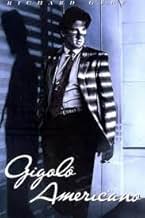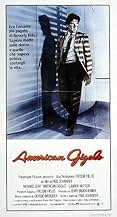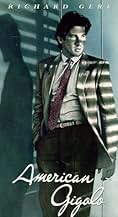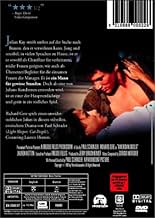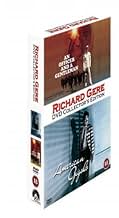American Gigolo
- 1980
- Tous publics
- 1h 57min
NOTE IMDb
6,3/10
31 k
MA NOTE
Julian est un gigolo, qui aime son travail. Malheureusement, lorsqu'un de ses clients est tué, il n'a pas d'alibi.Julian est un gigolo, qui aime son travail. Malheureusement, lorsqu'un de ses clients est tué, il n'a pas d'alibi.Julian est un gigolo, qui aime son travail. Malheureusement, lorsqu'un de ses clients est tué, il n'a pas d'alibi.
- Réalisation
- Scénario
- Casting principal
- Récompenses
- 2 nominations au total
Nina van Pallandt
- Anne
- (as Nina Van Pallandt)
Patricia Carr
- Judy Rheiman
- (as Patti Carr)
Macdonald Carey
- Hollywood Actor
- (as MacDonald Carey)
Avis à la une
It's important that Paul Schrader put 'American' in his title. This isn't just something to make it a title that is easily recognizable or to know what country it's from. It's about an American state of being, what it is to be a gigolo who likes swanky suits and fast cars and, well, the women he gets what he has to work for. But what happens when this man's reputation is called into question, or what kind of reputation a gigolo has? Politics also comes into it, not too oddly enough, as Julian (Richard Gere) catches the eye of a woman who is married to a Senator. That the movie is technically a murder mystery, sort of, as Julian is accused of killing a woman who he had seen previously as a 'fetish' customer, is almost besides the point. It is good for the plot, but what Julian has to focus on, the big question for him, is what is he doing with himself? How do other people look at him?
He makes himself a sex symbol, of sorts, as he works out religiously and always gets the best clothes (like a peacock perhaps). Schrader puts a lot of focus on the relationship Julian has with Michelle, who genuinely cares about him and is probably the only person he knows who is straight with him (certainly not the pimp played by Bill Duke, or his mentor who has her own gaggle of men and women to 'send out'). Of course sexuality plays into it, but I liked the fact that Schrader didn't focus squarely on it. He's interested in some of the mechanics of it (there's a scene where Julian/Michele do it, but it's shot much in the way of Godard's A Married Woman, lots of single shots of body parts, some flesh, but selective eroticism), and then, mostly, the consequences.
But, again, the look of the film should be an indicator. This is Los Angeles of 1979/1980, but it portends the future decade not just in the city but in the kind of middle-upper (or just upper) class lifestyle of expensive restaurants, good drinks, good clothes, and sometimes good women (or just lonely older women). Schrader even has a way of looking ahead to the future with Giorgio Moroder's score, which takes Blondie's "Call Me" and turns it into a synth score full of dread and mystery and drama. On top of how the look, its stylish exteriors and careful lighting (the Bruckheimer look before Tony Scott took it over with smoke machines), and the depth of the script, Gere is also fantastic here. He was on a roll right after Days of Heaven, and here he lights up the screen with charisma, pathos, intensity, and a sense of where to take the scenes where they need to be.
He, much like the environment around him, makes up what is the backdrop for a tale of morality in high society, hypocrisy where it may lay in the highs and lows, and what it means to fall in love. The only part it doesn't fully work is as a full-fledged thriller (again, the murder-mystery element is the weakest link), but everything else sparks the screen with interest and excitement.
He makes himself a sex symbol, of sorts, as he works out religiously and always gets the best clothes (like a peacock perhaps). Schrader puts a lot of focus on the relationship Julian has with Michelle, who genuinely cares about him and is probably the only person he knows who is straight with him (certainly not the pimp played by Bill Duke, or his mentor who has her own gaggle of men and women to 'send out'). Of course sexuality plays into it, but I liked the fact that Schrader didn't focus squarely on it. He's interested in some of the mechanics of it (there's a scene where Julian/Michele do it, but it's shot much in the way of Godard's A Married Woman, lots of single shots of body parts, some flesh, but selective eroticism), and then, mostly, the consequences.
But, again, the look of the film should be an indicator. This is Los Angeles of 1979/1980, but it portends the future decade not just in the city but in the kind of middle-upper (or just upper) class lifestyle of expensive restaurants, good drinks, good clothes, and sometimes good women (or just lonely older women). Schrader even has a way of looking ahead to the future with Giorgio Moroder's score, which takes Blondie's "Call Me" and turns it into a synth score full of dread and mystery and drama. On top of how the look, its stylish exteriors and careful lighting (the Bruckheimer look before Tony Scott took it over with smoke machines), and the depth of the script, Gere is also fantastic here. He was on a roll right after Days of Heaven, and here he lights up the screen with charisma, pathos, intensity, and a sense of where to take the scenes where they need to be.
He, much like the environment around him, makes up what is the backdrop for a tale of morality in high society, hypocrisy where it may lay in the highs and lows, and what it means to fall in love. The only part it doesn't fully work is as a full-fledged thriller (again, the murder-mystery element is the weakest link), but everything else sparks the screen with interest and excitement.
It's hard to precisely depict the impact of the smoky undertow of 1980s LA mores on the emotional and cultural landscape of the city, but Richard Gere's subversive topsy-turvy solo show comes close. Weird, well-shot and intriguing. The queasy feeling it leaves is hard to remove even days later. A/A-
"American Gigolo" really is slick and stylish. As slick and stylish as any film could be, so you really wonder whether this is Schrader's film or Jerry Bruckheimer's? If you look solely at the screenplay, it almost fits into the typical Schrader exploration of any given 'seedy underworld'. You could even argue that Julian and Michelle are in a way similar to Travis and Betty. Looking at the final product, however, I see a slick Hollywood mystery-thriller that's actually far more interesting for its romantic sub-plot than for any of the suspense parts.
Don't get me wrong, in places "American Gigolo" is a quality character study, and the romance is as well-written as you could ever expect from a major, mainstream Hollywood production, but the suspense thriller portion is just so banal, expected, and predictable that it really takes away from an otherwise very good film. Perhaps most worthy of praise here is Richard Gere who gives one of his best performances here, and I certainly cannot even begin to imagine John Travolta in the lead role.
It sounds like I'm criticizing how stylish this film is, I'm really not. It's pulled off pretty darn well in comparison to how many films of this sort have ended up, and you have to admit Gere's wardrobe is impressive. The film is well-shot and well-acted and for the most part quite well-written (although this is far, far from Paul Schrader's best work as a screenwriter). My comments on the film's slickness are really just a natural reaction to this film coming right after "Hardcore". Indeed, it seems like this film is a signpost for the early 80's (the dud of a score proves it) where in Hollywood even homicide cases with a Gigolo as the main suspect are glamorous rather than gritty.
A lot of people hate this film, but it has also gained a large cult following and a respectable following from film critics and aficionados, even landing a spot on the 'They Shoot Pictures, Don't They?' top 1000 list, and I can't really understand why anyone would have such extreme feelings about a film that is just watchable and entertaining. I don't think Schrader did his best work here, but it's not his worst either and the film as a whole is so unimposing and forgettable that I find it hard to believe it has so many fans and so many detractors.
7/10
Don't get me wrong, in places "American Gigolo" is a quality character study, and the romance is as well-written as you could ever expect from a major, mainstream Hollywood production, but the suspense thriller portion is just so banal, expected, and predictable that it really takes away from an otherwise very good film. Perhaps most worthy of praise here is Richard Gere who gives one of his best performances here, and I certainly cannot even begin to imagine John Travolta in the lead role.
It sounds like I'm criticizing how stylish this film is, I'm really not. It's pulled off pretty darn well in comparison to how many films of this sort have ended up, and you have to admit Gere's wardrobe is impressive. The film is well-shot and well-acted and for the most part quite well-written (although this is far, far from Paul Schrader's best work as a screenwriter). My comments on the film's slickness are really just a natural reaction to this film coming right after "Hardcore". Indeed, it seems like this film is a signpost for the early 80's (the dud of a score proves it) where in Hollywood even homicide cases with a Gigolo as the main suspect are glamorous rather than gritty.
A lot of people hate this film, but it has also gained a large cult following and a respectable following from film critics and aficionados, even landing a spot on the 'They Shoot Pictures, Don't They?' top 1000 list, and I can't really understand why anyone would have such extreme feelings about a film that is just watchable and entertaining. I don't think Schrader did his best work here, but it's not his worst either and the film as a whole is so unimposing and forgettable that I find it hard to believe it has so many fans and so many detractors.
7/10
Richard Gere is perfectly cast in the role of decadent but vulnerable male gigolo cum prostitute who is framed for a murder he didn't commit. His emotional entanglement with a married woman (Lauren Hutton) is believable, but the film is above all a dissection of the emptiness of the kind of stylish materialism which was to become such a hallmark of cosmopolitan lifestyle in the 80's. Like many such morality tales, though, the superficial attractiveness of the 'style' as a way of life is liable to lead some to embrace rather than reject it as a way of bringing excitement into their lives. In any event, a stylish piece of cinema.
This is one of Richard Gere's first lead roles in Hollywood, and he doesn't disappoint. The film gives a little insight, a preview even, of the seamier side of the 1980's. Beginning with the shots of Julian Kaye's (Gere) Mercedes convertible, glimpses of Rodeo Drives and Malibu (all with Blondie screaming "Call Me"!), the film manages to be more than just a whodunit. Perhaps the charm of the film for me is that we're never quite sure what to think of Kaye and his married lover (Lauren Hutton), but their quest for happiness with each other is believable. And though the detective plot-line of the movie is a little contrived, Detective Sunday and Leon provide good opposite poles of this Sodom and Gommarah-like portrayal of life in L.A. In fact, Julian's verbal sparring with Detective Sunday provide a light contrast with the realistic portrayal of a gigolo on the run.
Le saviez-vous
- AnecdotesDebbie Harry has said the film's main title song "Call Me" was inspired by driving and she visualized the film's opening sequence when writing it. She said: "When I was writing it, I pictured the opening scene [of the movie], driving on the coast of California." Harry was first given an instrumental rough track titled "Man Machine" by Giorgio Moroder and was asked to write the melody and lyrics for the song. Reportedly, this only took her a few hours to do.
- GaffesHelicopter carrying the camera is clearly reflected just above the right rear wheel of the Mercedes.
- Citations
Julian Kaye: Why me? Why did you pick me?
Leon: Because you were framable. You've stepped on too many toes. Nobody ever cared about you. I never even liked you much myself.
- Versions alternativesABC edited 21 minutes from this film for its 1983 network television premiere.
- Bandes originalesThe Love I Saw in You Is Just a Mirage
by Smokey Robinson (as W. Robinson) and Marvin Tarplin (as M. Tarplin)
Performed by Smokey Robinson & The Miracles (as Smokey Robinson and The Miracles)
Courtesy of Motown Records
Meilleurs choix
Connectez-vous pour évaluer et suivre la liste de favoris afin de recevoir des recommandations personnalisées
Détails
- Date de sortie
- Pays d’origine
- Site officiel
- Langues
- Aussi connu sous le nom de
- Gigoló americano
- Lieux de tournage
- Sunset Plaza Apartments - 1220 Sunset Plaza Drive, Mt. Olympus, Hollywood Hills, Los Angeles, Californie, États-Unis(Westwood Apartment Hotel, demolished 1987 and replaced by a totally different building - see GE at the actual address)
- Sociétés de production
- Voir plus de crédits d'entreprise sur IMDbPro
Box-office
- Budget
- 4 800 000 $US (estimé)
- Montant brut aux États-Unis et au Canada
- 22 743 674 $US
- Week-end de sortie aux États-Unis et au Canada
- 3 559 930 $US
- 3 févr. 1980
- Montant brut mondial
- 22 745 134 $US
Contribuer à cette page
Suggérer une modification ou ajouter du contenu manquant


